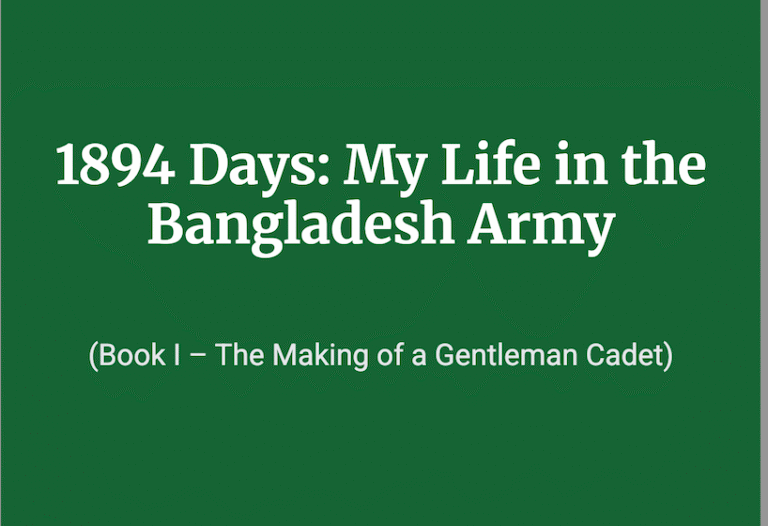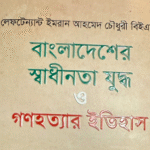A NEW BOOK IS COMING SOON
1894 DAYS: MY LIFE IN THE BANGLADESH ARMY
Book I – The Making of a Gentleman Cadet
By Lt. (Retd) Imran Ahmed Chowdhury, BEM
Dedication
To my comrades of the 8th BMA Long Course
Bangladesh Military Academy, Bhatiary
To those who marched beside me through mud and monsoon,
who shared rations, laughter, and silence,
who endured the same punishments and the same pride,
who fell, rose, and never gave up —
This book is for you.
You were more than coursemates;
You were brothers in a crucible that tested our limits and shaped our souls.
Through sleepless nights, bruised knees, shouted orders, and quiet victories,
We became not just soldiers but men of conscience.
Time has scattered us across continents and careers.
but the echo of our boots still resounds in memory —
steady, proud, unbroken.
For every face that once stood in line beside mine,
for every heart that beat with the rhythm of Bhatiary,
for the spirit of unity that no distance can erase —
This is our story.
Our 1,894 days.
This is Book I—the story of Bhatiary, of becoming, of endurance.
The next, Book II: As a Subaltern in the Bangladesh Army,
will carry the journey forward—from the parade ground to the battlefield of real life,
where the cadet became the officer,
and the lessons of Bhatiary were tested by the world beyond.
Lt. (Retd) Imran Ahmed Chowdhury, BEM
Acknowledgements
This book was not written in isolation.
It was born from the memories, sacrifices, and companionship of countless souls who shared the path with me—some near, some far, some long departed, yet all forever present in my heart.
To my comrades of the 8th BMA Long Course —
We entered Bhatiary as strangers and left as brothers.
Each of you left an indelible mark on my life.
Your laughter in hardship, courage in chaos, and loyalty in silence remain my proudest inheritance.
This book is as much yours as it is mine.
To my parents, who were my first teachers and moral compass —
my mother, whose beautifully handwritten English letters carried warmth and wisdom across the barracks walls,
and my father, whose quiet sacrifices arrived through humble money orders,
both of you sustained me when nothing else did.
Your strength and faith in me were the invisible uniform I wore.
To the memory of my brother, Babul Chowdhury —
the teenage freedom fighter who never lived to see me wear the cadet’s uniform,
but whose bravery and spirit guided my every march.
Your unfinished dream became my compass.
To my instructors and fellow officers,
who taught me — sometimes with kindness, sometimes through cruelty —
that leadership is not about shouting louder, but standing taller.
Even those who tested me beyond fairness helped me discover my own resilience.
To my friends and coursemates —
Aziz, Farid, Ridwan, Bahlul, Sadat, Mahbub Raihan, and many more —
our shared trials became stories of brotherhood.
Wherever life has taken you, may you know that Bhatiary still echoes with your voices.
To those who inspired me to write — my mentors, readers, and brothers-in-arms —
thank you for reminding me that history unspoken is history lost.
This book is my humble attempt to preserve the truth as I lived it.
Lastly, I bow in gratitude to the Almighty,
for giving me the strength to endure, the memory to remember,
and the words to finally tell the story.
This is the first volume of a two-part journey —
Book I: 1894 Days – My Life in the Bangladesh Army,
and its forthcoming continuation,
Book II: As a Subaltern in the Bangladesh Army.
To all who walked this path with me — in life or in spirit —
I thank you, salute you, and remember you.
Lt. (Retd) Imran Ahmed Chowdhury, BEM
Author’s Note
When I began writing 1894 Days: My Life in the Bangladesh Army, I did not intend to glorify or condemn the military.
I simply wanted to tell the truth — the truth of a young man’s journey through an institution that both built and bruised him.
This book is not about bitterness.
It is about becoming.
It is a tribute to endurance — the art of standing tall in the face of unfairness, and the courage to keep walking when applause is absent.
I wrote this not as a historian, but as a witness.
Every punishment, every humiliation, every letter from home, every act of kindness from a fellow cadet — they all stitched together the fabric of who I became.
Bhatiary was not a campus; it was a crucible.
It melted the ego, tested the will, and reforged the soul.
Those 1,894 days were not merely training — they were transformation.
Through these pages, I wanted to immortalise the spirit of my comrades of the 8th BMA Long Course,
to ensure that their laughter, pain, and courage would not fade into silence.
I wanted to remind readers that behind every uniform beats a human heart, longing to be understood.
As this volume closes, another begins.
Book II – As a Subaltern in the Bangladesh Army
will continue the journey — from the parade ground to the posts and borders,
from theory to reality,
from command to conscience.
For memory, like a soldier, never truly retires.
It simply stands guard over what made us who we are.
Lt. (Retd) Imran Ahmed Chowdhury, BEM
Northampton, United Kingdom
Chapter 1 – The Rain-Soaked Beginning
(Your first full narrative as written earlier — the journey from Sylhet to Chittagong, the first reception, the chaos of arrival, and the transformative shock of Bhatiary life.)
Chapter 2 – The Journey to Bhatiary
(Expanded description of the long wait at Chittagong Railway Station, the colonial remnants, the anticipation, and the first night’s fear.)
Chapter 3 – The First Reception
(The brutal initiation, confusion, the first humiliation — the symbolic breaking down of civilian identity.)
Chapter 4 – The Transformation Begins
(Learning the ropes — exhaustion, camaraderie, and the rhythm of a new life under discipline.)
Chapter 5 – Life in the Barracks
(The daily drills, language of command, evolving bonds between cadets, the culture shock.)
Chapter 6 – The Language of Command
(Exploring the English–Urdu–Bengali linguistic confusion and identity struggle inside BMA.)
Chapter 7 – Morning Starts at Night
(Description of unending schedules, exhaustion, resilience, and how cadets learned to adapt to deprivation.)
Chapter 8 – The First Taste of Discipline
(Early punishments and first realisation that discipline was both weapon and wisdom.)
Chapter 9 – The Friendship Factory
(How strangers became brothers: GC Aziz, GC Farid, GC Ridwan, GC Bahlul, GC Sadat — the making of unbreakable camaraderie.)
Chapter 10 – My Mother’s Letters
(Letters from home as emotional lifelines, her elegant English, father’s money orders, and how love from afar sustained you.)
Chapter 11 – The Season of Brutality
(The painful chapter of ragging, punishments, torture by senior cadets, and your endurance — transformation through survival.)
Chapter 12 – The Academy of Excellence
(Bhatiary’s vision — professionalism, discipline, mentorship, and its silent dignity amid scarcity.)
Chapter 13 – Naked Favouritism
(How beauty, pedigree, and cadet college background dictated promotion — the irony of “face over merit.”)
Chapter 14 – Nepotism and No Respect for the Liberation War
(The disillusionment with institutional amnesia about 1971 and the erasure of heroes like your father and EPR comrades.)
Chapter 15 – The Academy of the Killers: The Kakul Shadow
(BMA’s inherited model from Pakistan — from uniforms to ideology — and your awakening to its moral irony.)
Chapter 16 – “In the Attack”
(Your moral shock at seeing a fascist quote by Mussolini used as military wisdom; reflection on your parents’ humanist education in Kolkata during WWII.)
Chapter 17 – The Last Leg of BMA
(Choosing Infantry and the Mighty East Bengal Regiment in honour of your martyred brother Babul; your excellence ignored under favouritism but integrity intact.)
Chapter 18 – The Dream, the Girl, and the Illusion of Love
(The personal story of love, longing, betrayal, and how heartbreak became the hidden discipline of your soul.)
Chapter 19 – 1894 Days Later: The Long March Home
“I entered Bhatiary as a dreamer and left as a man carved by fire.
They gave me orders; life gave me lessons.
When I walked away, I carried no medals — only memories.
But sometimes, memories weigh more than metal.”
(Full final chapter — your emotional departure, reflections, ghosts, gratitude, maturity, and the peace after the parade.)
Epilogue – Peace After Parade
1,894 days.
Count them as you like — in drills, punishments, or prayers — they were all milestones on the same road home.
I did not leave with medals.
I left with meaning.
I did not march for power.
I marched for purpose.
I did not return with applause.
I returned with peace.
Because Bhatiary, in all its cruelty and glory, did not teach me how to command others —
it taught me how to command myself.
“Some journeys end where they began —
mine ended in understanding why I began at all.”
End of Book I
Lt. (Retd) Imran Ahmed Chowdhury, BEM
Northampton, United Kingdom



